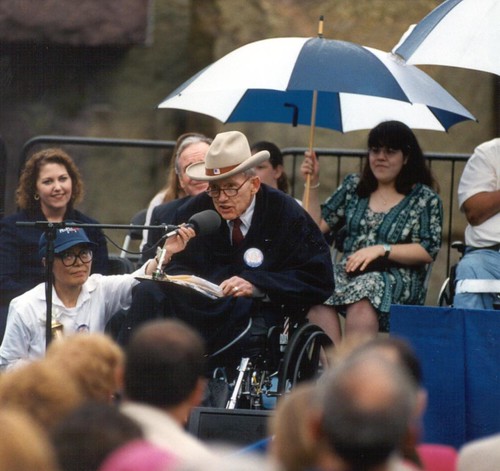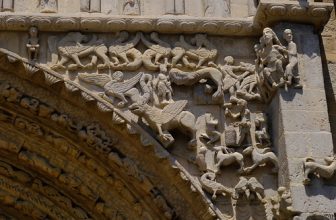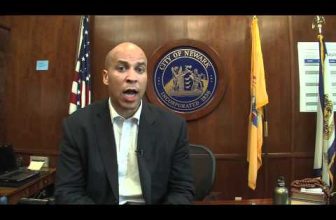

(Photo Description: Justin Dart is seated in a wheelchair with his cowboy hat on his head. Yosiko Dart leans in from his right with a microphone. The foreground shows the blurred heads of people in the audience and there are several people sitting behind him on stage, including Senator Tom Harkin and an unidentified lady with an umbrella.)
Obituary By Fred Fay and Fred Pelka, written at Justin Dart’s request.
Justin Dart, Jr., a leader of the international disability rights movement and a renowned human rights activist, died last night at his home in Washington D.C. Widely recognized as "the father of the Americans with Disabilities Act" and "the godfather of the disability rights movement," Dart had for the past several years struggled with the complications of post-polio syndrome and congestive heart failure. He was seventy-one years old. He is survived by his wife Yoshiko, their extended family of foster children, his many friends and colleagues, and millions of disability and human rights activists all over the world.
Dart was a leader in the disability rights movement for three decades, and an advocate for the rights of women, people of color, and gays and lesbians. The recipient of five presidential appointments and numerous honors, including the Hubert Humphrey Award of the Leadership Conference on Civil Rights, Dart was on the podium on the White House lawn when President George H. Bush signed the ADA into law in July 1990. Dart was also a highly successful entrepreneur, using his personal wealth to further his human rights agenda by generously contributing to organizations, candidates, and individuals, becoming what he called "a little PAC for empowerment."
In 1998 Dart received the Presidential Medal of Freedom, the nation’s highest civilian award. "Justin Dart," said President Clinton in 1996, "in his own way has the most Olympian spirit I believe I have ever come across."
Until the end, Dart remained dedicated to his vision of a "revolution of empowerment." This would be, he said, "a revolution that confronts and eliminates obsolete thoughts and systems, that focuses the full power of science and free-enterprise democracy on the systematic empowerment of every person to live his or her God-given potential." Dart never hesitated to emphasize the assistance he received from those working with him, most especially his wife of more than thirty years, Yoshiko Saji.
"She is," he often said, "quite simply the most magnificent human being I have ever met."
Time and again Dart stressed that his achievements were only possible with the help of hundreds of activists, colleagues, and friends. "There is nothing I have achieved, and no addiction I have overcome, without the love and support of specific individuals who reached out to empower me…
There is nothing I have accomplished without reaching out to empower others." Dart protested the fact that he and only three other disability activists were on the podium when President Bush signed the ADA, believing that "hundreds of others should have been there as well." After receiving the Presidential Medal of Freedom, Dart sent out replicas of the award to hundreds of disability rights activists across the country, writing that, "this award belongs to you."
Justin Dart, Jr., was born on August 29, 1930, into a wealthy and prominent family. His grandfather was the founder of the Walgreen Drugstore chain, his father a successful business executive, his mother a matron of the American avant garde. Dart would later describe how he became "a super loser" as a way of establishing his own identity in this family of "super winners." He attended seven high schools, not graduating from any of them, and broke Humphrey Bogart’s all-time record for the number of demerits earned by a student at elite Andover prep. "People didn’t like me. I didn’t like myself."
Dart contracted polio in 1948. With doctors saying he had less than three days to live, he was admitted into the Seventh Day Adventist Medical University in Los Angeles. "For the first time in my life I was surrounded by people who were openly expressing love for each other, and for me, even though I was hostile to them. And so I started smiling at people, and saying nice things to them. And they responded, treating me even better.
It felt so good!" Three days turned into forty years, but Dart never forgot this lesson. Polio left Dart a wheelchair user, but he never grieved about this. "I count the good days in my life from the time I got polio. These beautiful people not only saved my life, they made it worth saving."
Another turning point was Dart’s discovery in 1949 of the philosophy of Mohandas K. Gandhi. Dart defined Gandhi’s message as, "Find your own truth, and then live it." This theme too would stay with him for the rest of his life. Dart attended the University of Houston from 1951 to 1954, earning his bachelor’s and master’s degrees in political science and history. He wanted to be a teacher, but the university withheld his teaching certificate because he was a wheelchair user. During his time in college, Dart organized his first human rights group — a pro-integration student group at what was then a whites-only institution.
Dart went into business in 1956, building several successful companies in Mexico and Japan. He started Japan Tupperware with three employees in 1963, and by 1965 it had expanded to some 25,000. Dart used his businesses to provide work for women and people with disabilities. In Japan, for example, he took severely disabled people out of institutions, gave them paying jobs within his company, and organized some of them into Japan’s first wheelchair basketball team. It was during this time he met his wife, Yoshiko.
The final turning point in Dart’s life came during a visit to Vietnam in 1966, to investigate the status of rehabilitation in that war-torn country. Visiting a "rehabilitation center" for children with polio, Dart instead found squalid conditions where disabled children were left on concrete floors to starve. One child, a young girl dying there before him, took his hand and looked into his eyes. "That scene," he would later write, "is burned forever in my soul. For the first time in my life I understood the reality of evil, and that I was a part of that reality."
The Darts returned to Japan, but terminated their business interests.
After a period of meditation in a dilapidated farmhouse, the two decided to dedicate themselves entirely to the cause of human and disability rights. They moved to Texas in 1974, and immersed themselves in local disability activism.
From 1980 to 1985, Dart was a member, and then chair, of the Texas Governor’s Committee for People with Disabilities.
His work in Texas became a pattern for what was to follow: extensive meetings with the grassroots, followed by a call for the radical empowerment of people with disabilities, followed by tireless advocacy until victory was won.
In 1981, President Ronald Reagan appointed Dart to be the vice-chair of the National Council on Disability. The Darts embarked on a nationwide tour, at their own expense, meeting with activists in every state. Dart and others on the Council drafted a national policy that called for national civil rights legislation to end the centuries old discrimination of people with disabilities — what would eventually become the Americans with Disabilities Act of 1990.
In 1986, Dart was appointed to head the Rehabilitation Services Administration, a $3 billion federal agency that oversees a vast array of programs for disabled people. Dart called for radical changes, and for including people with disabilities in every aspect of designing, implementing, and monitoring rehabilitation programs. Resisted by the bureaucracy, Dart dropped a bombshell when he testified at a public hearing before Congress that the RSA was "a vast, inflexible federal system which, like the society it represents, still contains a significant portion of individuals who have not yet overcome obsolete, paternalistic attitudes about disability." Dart was asked to resign his position, but remained a supporter of both Presidents Reagan and Bush. In 1989, Dart was appointed chair of the President’s Committee on the Employment of People with Disabilities, shifting its focus from its traditional stance of urging business to "hire the handicapped" to advocating for full civil rights for people with disabilities.
Dart is best known for his work in passing the Americans with Disabilities Act. In 1988, he was appointed, along with parents’ advocate Elizabeth Boggs, to chair the Congressional Task Force on the Rights and Empowerment of Americans with Disabilities. The Darts again toured the country at their own expense, visiting every state, Puerto Rico, Guam, and the District of Columbia, holding public forums attended by more than 30,000 people. Everywhere he went, Dart touted the ADA as "the civil rights act of the future." Dart also met extensively with members of Congress and staff, as well as President Bush, Vice President Quayle, and members of the Cabinet. At one point, seeing Dart at a White House reception, President Bush introduced him as "the ADA man." The ADA was signed into law on July 26, 1990, an anniversary that is celebrated each year by "disability pride" events all across the country.
While taking pride in passage of the ADA, Dart was always quick to list all the others who shared in the struggle: Robert Silverstein and Robert Burgdorf, Patrisha Wright and Tony Coelho, Fred Fay and Judith Heumann, among many others. And Dart never wavered in his commitment to disability solidarity, insisting that all people with disabilities be protected by the law and included in the coalition to pass it — including mentally ill "psychiatric survivors" and people with HIV/AIDS. Dart called this his "politics of inclusion," a companion to his "politics of principle, solidarity, and love."
After passage of the ADA, Dart threw his energy into the fight for universal health care, again campaigning across the country, and often speaking from the same podium as President and Mrs. Clinton. With the defeat of universal health care, Dart was among the first to identify the coming backlash against disability rights. He resigned all his positions to become "a full-time citizen soldier in the trenches of justice." With the conservative Republican victory in Congress in 1994, followed by calls to amend or even repeal the ADA and the Individuals with Disabilities Education Act (or IDEA), Dart, and disability rights advocates Becky Ogle and Frederick Fay, founded Justice for All, what Dart called "a SWAT team" to beat back these attacks. Again, Dart was tireless — traveling, speaking, testifying, holding conference calls, presiding over meetings, calling the media on its distortions of the ADA, and flooding the country with American flag stickers that said, "ADA, IDEA, America Wins." Both laws were saved. Dart again placed the credit with "the thousands of grassroots patriots" who wrote and e-mailed and lobbied. But there can be no doubt that without Dart’s leadership, the outcome might have been entirely different.
In 1996, confronted by a Republican Party calling for "a retreat from Thomas Jefferson, Abraham Lincoln democracy," Dart campaigned for the re-election of President Clinton. This was a personally difficult "decision of conscience." Dart had been a Republican for most of his life, and had organized the disability constituency campaigns of both Ronald Reagan and George Bush, campaigning against Clinton in 1992. But in a turnabout that was reported in the New York Times and the Washington Post, Dart went all out for Clinton, even speaking at the Democratic National Convention in Chicago. The Darts yet again undertook a whirlwind tour of the country, telling people to "get into politics as if your life depended on it. It does." At his speech the day after the election, President Clinton publicly thanked Dart for personally campaigning in all fifty states, and cited his efforts as "one reason we won some of those states."
Dart suffered a series of heart attacks in late 1997, which curtailed his ability to travel. He continued, however, to lobby for the rights of people with disabilities, and attended numerous events, rallies, demonstrations and public hearings. Toward the end of his life, Dart was hard at work on a political manifesto that would outline his vision of "the revolution of empowerment." In its conclusion, he urged his "Beloved colleagues in struggle, listen to the heart of this old soldier. Our lives, our children’s lives, the quality of the lives of billions in future generations hangs in the balance. I cry out to you from the depths of my being. Humanity needs you! Lead! Lead! Lead the revolution of empowerment!"
Today, disabled people across the country and around the world will grieve at the passing of Justin Dart, Jr. But we will celebrate his love and his commitment to justice. Please join us at in expressing our condolences to Yoshiko and her family during this difficult time. Keep in mind, however, that it was Justin’s wish that any service or commemoration be used by activists to celebrate our movement, and as an opportunity to recommit themselves to "the revolution of empowerment."
Posted by Princess Stand in the Rain on 2011-09-25 14:57:27
Tagged: , Justin Dart , empowerment , ADA , Father of ADA , Lead On






